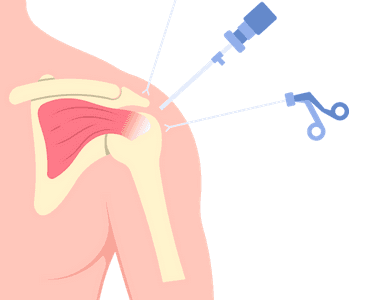The shoulder is one of the most complex joints in the body, with a group of muscles and tendons that work together to ensure smooth, stable movement of the arm. Among the common injuries that may affect the shoulder is a rotator cuff injury, which requires a precise understanding of its causes, symptoms, and treatment methods.
What is the rotator cuff?
The rotator cuff is a group of muscles and tendons that surround the shoulder joint and stabilize the head of the humerus within its socket in the shoulder bone. These muscles and tendons are responsible for moving the shoulder and holding it in place during daily activities.
Causes of rotator cuff injury
Rotator cuff injuries usually occur due to wear and tear of tissue over time or as a result of a direct injury. The main factors that contribute to an injury include:
- Aging: As we age, the chances of tendons and muscles wearing down increase, increasing the risk of a rotator cuff tear.
- Repetitive activities: Activities that require raising the arms above head level repeatedly, such as painting and carpentry, can lead to tendon damage.
- Acute injuries: Falls or accidents can cause a tear in the rotator cuff.
- Intense sports: Sports that require intense physical effort, such as basketball and tennis, can increase the risk of injury.
Symptoms of a rotator cuff tear
Symptoms vary depending on the severity of the infection, but can include:
- Persistent pain: The pain is usually described as a deep dull ache in the shoulder, which may get worse during sleep.
- Muscle weakness: Weakness in the arm, making it difficult to perform daily activities such as combing hair or extending the hand behind the back.
- Cracking sound: In some cases, a cracking sound may occur when moving the shoulder.
When should you visit a doctor?
It is important to consult a doctor if you experience weakness in the arm after an injury, or if pain symptoms continue for several days without improvement. Early diagnosis can help avoid complications and improve the chances of recovery.
Read also: The latest treatments and surgical techniques for rotator cuff injuries
Diagnosis and treatment of rotator cuff tears
A rotator cuff tear is diagnosed through a clinical examination and medical imaging such as an X-ray or MRI. Depending on the severity of the injury, treatment may include:
- Physical therapy: exercises to improve the strength and flexibility of the muscles surrounding the shoulder.
- Medications: to relieve pain and swelling.
- Ice: to reduce swelling and pain.
- Steroid injections: in cases of severe pain.
- Surgery: in cases that do not respond to non-surgical treatment.
Read also: Early diagnosis of rotator cuff injuries
Preventing rotator cuff injury
To protect against rotator cuff injuries, it is recommended that you follow some guidelines:
- Warm up well: before doing any physical activity.
- Muscle strengthening: Doing exercises that strengthen the shoulder muscles.
- Avoid repetitive movements, which may put excessive pressure on the shoulder.
By following these guidelines, you can reduce your risk of injury and maintain shoulder health. If you are experiencing symptoms related to the rotator cuff, do not hesitate to seek medical advice for further guidance and appropriate treatment.
Read also: The effect of rotator cuff injury on daily activities and how to adapt

